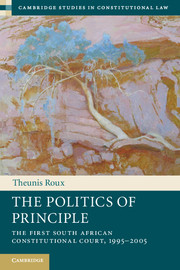Book contents
- Frontmatter
- Contents
- Acknowledgements
- Introduction
- Part I Problematic, Theory, Methodology
- Part II Context
- Part III Thematic Case Studies
- 6 Death, desire and discrimination: the Chaskalson Court between constitutional and positive morality
- 7 Social rights
- 8 Property rights
- 9 Political rights
- 10 Cross-cutting strategies
- Conclusion
- Bibliography
- Index
- References
8 - Property rights
Published online by Cambridge University Press: 05 April 2013
- Frontmatter
- Contents
- Acknowledgements
- Introduction
- Part I Problematic, Theory, Methodology
- Part II Context
- Part III Thematic Case Studies
- 6 Death, desire and discrimination: the Chaskalson Court between constitutional and positive morality
- 7 Social rights
- 8 Property rights
- 9 Political rights
- 10 Cross-cutting strategies
- Conclusion
- Bibliography
- Index
- References
Summary
Far from representing a ‘victory’ for the National Party, the property clause in the 1996 Constitution is best understood as embodying the ANC’s hybrid human rights tradition. As we saw in Chapter 4, the ANC had long mediated socialist calls for nationalisation of the means of production and African nationalist demands for full inclusion in the economy. These competing concerns are reflected in the text of the property clause, s 25, which attempts to strike a balance between protecting the institution of private property and allowing significant state intervention to redress past injustices and meet present welfare needs. While it is also possible to see these provisions as the product of an ‘insurance swap’ between the ANC and the National Party, the better explanation is that the property clause gave expression to the ANC’s long-standing preference for a democratically managed market economy.
Whatever its precise political origins, the inclusion of a property clause in the 1996 Constitution clearly gave the Chaskalson Court a central role in overseeing the procedural fairness and moral justifiability of reforms to the existing property rights order. On the one hand, the clause required the Court to guarantee the stability of that order by ensuring that whatever measures were taken to redress past injustices and meet present welfare needs were pursued in an orderly, rule-of-law-respecting fashion. On the other, the clause required the Court to develop the normative framework within which the remoralisation of the existing property rights order should occur. On the face of it, this promised to be one of the most challenging aspects of the Court’s work, with the judges required to steer between the Scylla of status-quo-protectionism and the Charybdis of redistributive populism.
- Type
- Chapter
- Information
- The Politics of PrincipleThe First South African Constitutional Court, 1995–2005, pp. 304 - 333Publisher: Cambridge University PressPrint publication year: 2013

